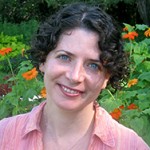When Erica S. Perl was a child frequent moves and her faith left her feeling like the odd man out. “We lived in a part of Rhode Island where there weren’t that many Jews that we were connected to,” Perl says. “The summer before I went into third grade we moved to Vermont, and in Vermont it was even more extreme. It wasn’t just the religious piece of it, it was my identity, the way I looked…I felt like nobody looked like me and everybody…fit in and I didn’t.” She took solace in books, and now as an author frequently addresses the issue of belonging to reach the child that somehow feels different.
Some of Perl’s fondest memories revolve around libraries. “For me wanting to write books was about the fact that I was really fixated on libraries,” she says. “I thought libraries were where all the great stuff was. I fantasized about having my name on the spine of a book in a library.” She dabbled in plays and short stories throughout high school and college, but then went to Tulane University Law School and became a public defender in New York.
Unfortunately, criminal defense work did not satisfy Perl’s creativity. “When you’re a criminal defense lawyer you have to stick to the facts,” she says. “You can’t weave fiction into your client’s story.” A night class on writing and illustrating children’s books became her creative outlet. “That opened my eyes to what the field was like and what the possibilities were.” She received encouragement from her teacher and learned about The Society of Children’s Book Writers and Illustrators (www.scbwi.org), “an organization I could join even though I wasn’t published.” Perl’s experience in the class gave her the permission she craved to study children’s books and figure out how the various elements came together.
“Long before I had kids I was obsessed with [children’s books],” Perl says. “I felt [they] were the best thing there was and I aspired to write the kinds of books that I remembered from my own childhood.” To achieve that goal, Perl connects with the kid she used to be and the kids she knows now. “I have two [daughters] of my own and spend a lot of time doing school visits and getting out there with kids.” Perl writes for a wide age range—kindergartners to young adults. “I’m always sort of thinking in my head who my reader is, what makes them tick, what they think is funny, what’s going to surprise them, so I’m always inspired by making that connection with the reader.”
For example, Chicken Butt came from the call-and-response game that kids play: You know what? Chicken butt! Perl challenged herself to create variations on the theme and planned to write an irreverent board book for parents who were tired of Pat the Bunny. But books never follow a linear creative path. Perl realized that the kids who loved chicken butt jokes were ages three through six, not the toddler set, so she scribbled more ideas in her notebook and then typed out a draft manuscript on her computer. When she printed the manuscript to edit, she realized she had a conversation in two voices, but who was talking? She didn’t know. A trip to her daughter’s preschool class clarified that Chicken Butt was actually a dialogue between parent and child that involved an escalating confrontation in which the child pushed to see how far the rules could bend without breaking.
When Perl began writing her middle-grade novel When Life Gives You O.J. she thought it was a picture book about a girl whose well-meaning grandfather gave her an inanimate object as a substitute for the live pet she craved. But the story took on a life of its own. “I realized there was so much more I wanted to put in,” Perl says. Autobiographical fragments from Perl’s life became the backdrop of the story, for example her longing for a dog and the time when her grandfather lived with the family. Although Perl used humor as her entry point, she took inspiration from authors Roald Dahl and Daniel Pinkwater and wove strong emotion and a narrative arc that added depth to the award-winning book.
Perl attempts to write every day, but intersperses the demands of writing between family and job. “I work a full nine-to-five week and try to write around that,” she says. “I write on weekends. I take vacation time to write.” She heads up the publisher and author relations team at First Book (www.firstbook.org), a non-profit organization that distributes free or low-cost books and educational resources to programs and schools serving children from low-income families throughout the United States and Canada. “My job fits very nicely with the fact that I am a writer.”
When Perl visits schools she says kids often think she knows what she’s doing because she’s published. In fact, Perl says, “I’m still trying to figure it out. With each book I’m starting new and I don’t know what I’m doing. With each story I’m trying to find my way. It’s a constant process and I hope kids understand that, but I’m having so much fun that I can’t stop doing it.”


